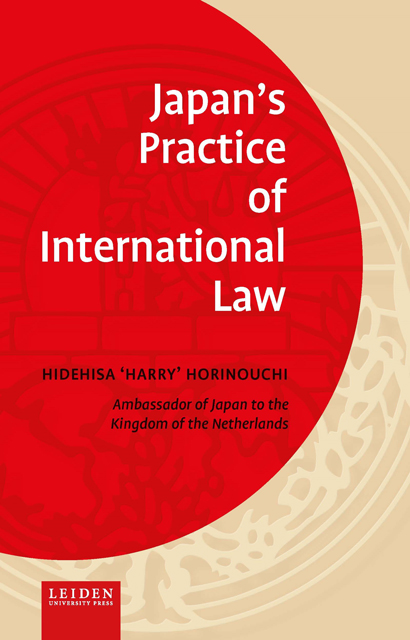Book contents
- Frontmatter
- Dedication
- Contents
- Foreword
- Chapter I Security and the Right of Self-Defense: 8 Hours on September 11
- Chapter II The End of the War: How World War II ended in Asia
- Chapter III The Remnants of War: Chemical Weapon: Poisonous Gas Accident in Qiqihar City, Heilongjiang Province
- Chapter IV Waters: Spy Vessel Incident in the Southwest Waters of Kyushu
- Chapter V Consular Affairs: Japan-China Consular Agreement:* Trajectory from the Shenyang Consulate-General Incident
- Chapter VI Human Rights of a Hijacker: CAAC Flight Hijacking Incident
- Epilogue
- Frontmatter
- Dedication
- Contents
- Foreword
- Chapter I Security and the Right of Self-Defense: 8 Hours on September 11
- Chapter II The End of the War: How World War II ended in Asia
- Chapter III The Remnants of War: Chemical Weapon: Poisonous Gas Accident in Qiqihar City, Heilongjiang Province
- Chapter IV Waters: Spy Vessel Incident in the Southwest Waters of Kyushu
- Chapter V Consular Affairs: Japan-China Consular Agreement:* Trajectory from the Shenyang Consulate-General Incident
- Chapter VI Human Rights of a Hijacker: CAAC Flight Hijacking Incident
- Epilogue
Summary
In September 2001, I was asked by the Waseda University Graduate School of Law to give a lecture to graduate students as a part-time lecturer. As the Director of the Legal Affairs Division of the Ministry of Foreign Affairs, I was working on everyday diplomatic issues from the perspective of international law, so giving a weekly lecture to graduate students of the leading private university in Japan was an extremely challenging invitation. At that time, I was in charge of “connecting the Ministry of Foreign Affairs and the International Law Society”, so there were many opportunities to exchange opinions with professors, like chairing the International Law Study Group at the Ministry of Foreign Affairs four times a year, and monthly international law study sessions with a limited number of professors. There were many heated arguments about diplomatic issues at such meetings. Still, those were discussions of international law practitioners facing daily diplomatic issues and differed from the scholar’s point of view conducting the theory and judicial precedent studies.
From the fall of that year to the next spring, and from the fall of the following year to the spring of 2003, I visited Waseda University every Saturday and organized a seminar with more than a dozen graduate students. At the seminar, I assigned each student a diplomatic issue that Japan was facing and asked them to present the case, the government’s judgment, its background, and their evaluation under international law while I was giving comments on the presentation. However, those discussions with graduate students turned out to be unexpectedly shocking to me. There is no problem if the evaluation of cases under international law and the student’s arguments are different from those of the government. Because that is the discussion that should be held in a free academic institution, and it is the only way to enhance each other. However, as a problem before such arguments, the students had no understanding at all of how the government perceived the issues under international law and what kind of logic it had created to handle the case.
Naturally, my initial reaction was, “Don’t young people these days study anything?” However, as the discussions continued, I was struck by the question of how graduate students could get to know the government’s thinking.
- Type
- Chapter
- Information
- Japan’s Practice of International Law , pp. 133 - 135Publisher: Amsterdam University PressPrint publication year: 2022

